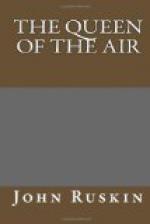* In order fully to utilize this natural power, we only require machinery to turn the variable into a constant velocity—no insurmountable difficulty.
131. (2d.) In employing all the muscular power at our disposal we are to make the employments we choose as educational as possible; for a wholesome human employment is the first and best method of education, mental as well as bodily. A man taught to plough, row, or steer well, and a woman taught to cook properly, and make a dress neatly, are already educated in many essential moral habits. Labor considered as a discipline has hitherto been thought of only for criminals; but the real and noblest function of labor is to prevent crime, and not to be Reformatory, but Formatory.
132. The third great principle of employment is, that whenever there is pressure of poverty to be met, all enforced occupation should be directed to the production of useful articles only; that is to say, of food, of simple clothing, of lodging, or of the means of conveying, distributing, and preserving these. It is yet little understood by economists, and not at all by the public, that the employment of persons in a useless business cannot relieve ultimate distress. The money given to employ riband-makers at Coventry is merely so much money withdrawn from what would have employed lace-makers at Honiton; or makers of something else, as useless, elsewhere. We must spend our money in some way, at some time, and it cannot at any time be spent without employing somebody. If we gamble it away, the person who wins it must spend it; if we lose it in a railroad speculation, it has gone into some one else’s pockets, or merely gone to pay navies for making a useless embankment, instead of to pay riband or button




